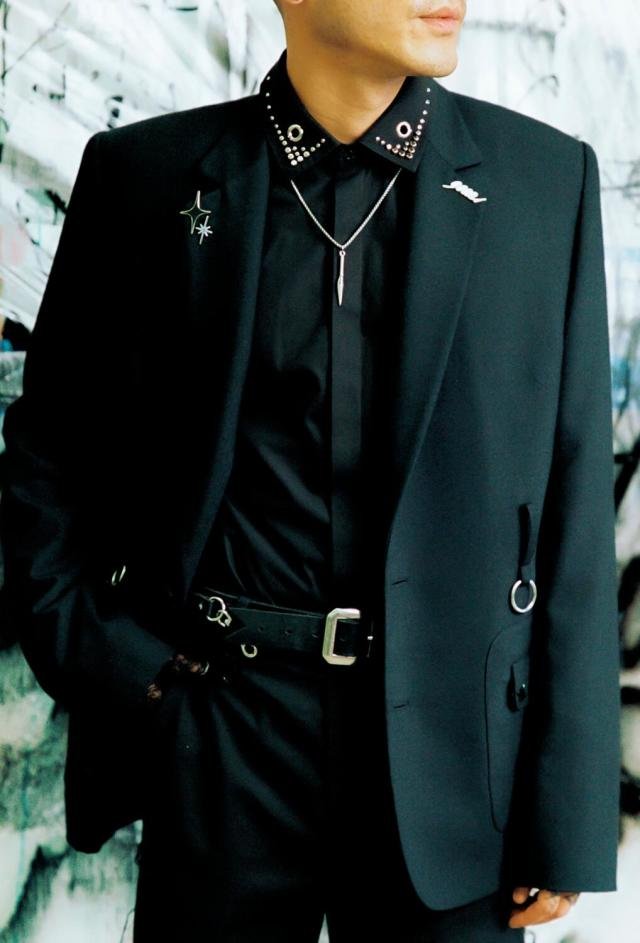Sharp Suits, Sharper Truths: Lessons From Firmé Atelier’s Eric Kim
When FAST members sat down for a workshop with acclaimed designer Eric Kim of Firmé Atelier, most expected motivation and a promotion of his brand name, the standard for an event of this kind. But the words of wisdom they received were ones of precaution, a reflection of his many years in the industry and grounded in the gritty reality of working in fashion.
Late that Tuesday, October 22nd, addressing a room of designers and non-designers alike, Kim detailed his journey as an LA native, navigating the complex, ever-shifting fashion scene. Although the event occurred in the brutal, maze-like building that is Boelter Hall, the excitement in the room contrasted with the structure’s coldness. Picture after picture flashed on the screen, displaying his signature bespoke designs with tattoo-inspired detailing and silver hardware.
From left to right: Quinn Wynacht (Co-President), Eric Kim (Guest Speaker), Alina Beaman (Design Co-Director), Lianne Calvo (Styling Co-Director)
Louise Meng / LA Times
Firmé Atelier broke out onto the scene in 2018, gaining an online presence from both its celebrity creations and trademark, ornamental suits. “Atelier” is French for “workshop”, and each custom-made piece is tailored to have a signature sharpness to its fit. Kim works one-on-one with clients to ensure designs fit their vision, building from a simple, monochromatic suit to a truly unique outfit; at Firmé Atelier, elevating the ordinary underscores individual identity.
From working in trade school to designing looks for Drake’s “It’s All a Blur” tour, the designer has stayed true to his humble Los Angeles roots. His looks integrate the city’s diverse culture and style, blending streetwear and high fashion. His signature bold silhouettes and intricate detailing reflect the vibrant and eclectic nature of LA fashion. Through collaborations with nearby artisans and sourcing materials from the city, his designs reflect his community-oriented spirit which prompts his involvement in local events, like student-led speaker events.
To his FAST audience, Kim emphasized the role of trust in the fashion industry. He underscored how challenging it can be to find those who will offer genuine support, yet, he also stressed the joy of finding individuals who understand your vision and believe in your capabilities. The designer credited his brand’s success to the relationships he has cultivated. As a brand with minimal promotion, Firmé took off through word of mouth and the formation of individual connections rather than mass-market advertising. Though less conventional, this strategy proved effective, prompting his work to be requested by the likes of Rihanna’s halftime band and Lil Uzi Vert. Kim highlights the role of community ties — conducive to success and design inspiration.
Lil Uzi Vert in a Firmé Atelier Bespoke Jacket on His “Pink Tape” Album Cover. Source: Pitchfork
In the Q&A, Kim addressed a room of aspiring designers. Perhaps, people who grew up with the allure of Project Runway and hope to “make it big.” Reacting to their eagerness, Kim’s response can only be described as one word — honest. Would he do it again? His reply: “No.” And yet, he explained that he was too far to turn back. Whether his words reflected commitment or stubbornness, is unclear. He revealed how the beginning is difficult. Financing is also a challenge. And yet, as he stood in front of the room in a suit he designed himself, he shared the love he had for artistry — for being able to translate an idea to reality, to reflect one’s city in outfit form. The audience hung onto each word and posed questions to understand his journey better. What drove him? How does he find his inspiration? Kim thoughtfully addressed each one — recalling his upbringing, early sewing jobs, and interactions with celebrity stylists. Though he highlighted the roughness of the industry, one that remains a struggle to navigate years into the business, his view of fashion itself remained positive as a tool for expression and empowerment.
Kim’s refreshing honesty offers a clear view of the pros and cons of pursuing design. Knowing the risks, challenges, and social isolation, will these future up-and-coming artists allow themselves to be overcome by fear? Or will they, like Kim, take that leap in pursuit of passion?





